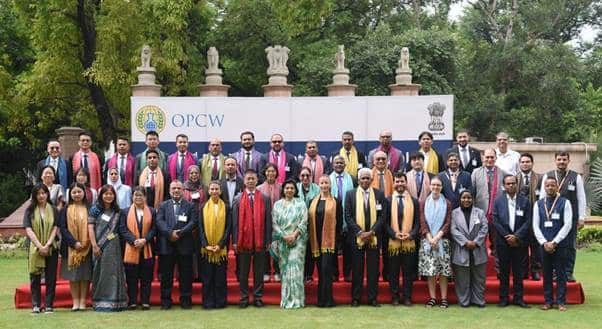Organisation for the Prohibition of Chemical Weapons Holds Asia Meeting in New

The Chemical Weapons Convention (CWC), which came into effect in 1997, aims to eliminate chemical weapons globally. The Organisation for the Prohibition of Chemical Weapons (OPCW) oversees this initiative, with 193 member states committed to its goals. India, as an original signatory, plays a significant role in this effort through its National Authority Chemical Weapons Convention (NACWC). Recently, the NACWC successfully mentored Kenya’s national authority, and the Indian Chemical Council (ICC) received the prestigious OPCW-The Hague Award 2024 for its contributions to chemical safety and compliance.
India’s Role in the Chemical Weapons Convention
India has been a proactive participant in the Chemical Weapons Convention since its inception. The NACWC is the designated authority responsible for implementing the CWC within India. This body ensures that the country adheres to its obligations under the convention, promoting safety and compliance in the chemical industry. In a notable achievement, the NACWC recently mentored the Kenya National Authority as part of the OPCW Mentorship/Partnership Programme. This initiative aims to enhance the capacity of national authorities in implementing the CWC effectively. Such collaborations highlight India’s commitment to global disarmament efforts and its willingness to share expertise with other nations.
Recognition for the Indian Chemical Council
The Indian Chemical Council (ICC), the oldest chemical industry association in India, has been instrumental in promoting chemical safety and compliance with the CWC. In 2024, the ICC was awarded the OPCW-The Hague Award, marking a historic moment as it became the first chemical industry body globally to receive this honor. The award recognizes organizations that significantly contribute to the goals of the CWC. The ICC’s efforts in enhancing security practices within the industry have garnered international recognition, showcasing India’s leadership in chemical safety and its commitment to the principles of the convention.
Regional Meetings to Enhance Cooperation
The OPCW organizes annual Regional Meetings of National Authorities to facilitate the implementation of the CWC. These meetings provide a platform for member states to exchange experiences, discuss challenges, and share best practices. The 23rd Regional Meeting of National Authorities for States Parties in Asia took place in New Delhi, hosted by the NACWC. This event brought together 38 delegates from 24 countries, including Australia, China, and Japan, along with officials from the OPCW and the United Nations Regional Centre for Peace and Disarmament in Asia and the Pacific. The discussions focused on legislative frameworks, chemical safety, and the role of stakeholders, including the chemical industry.
Outcomes and Future Directions
During the three-day Regional Meeting, delegates engaged in fruitful discussions about national implementation challenges and opportunities for cooperation. Topics included the integration of artificial intelligence in chemical safety and updates on synergies between the CWC and United Nations Security Council Resolution 1540. The meeting aimed to strengthen regional cooperation among Asian countries in implementing the CWC effectively. By fostering collaboration and sharing knowledge, the OPCW and its member states are working towards a safer and more secure future free from chemical weapons.
Observer Voice is the one stop site for National, International news, Sports, Editor’s Choice, Art/culture contents, Quotes and much more. We also cover historical contents. Historical contents includes World History, Indian History, and what happened today. The website also covers Entertainment across the India and World.
Follow Us on Twitter, Instagram, Facebook, & LinkedIn

